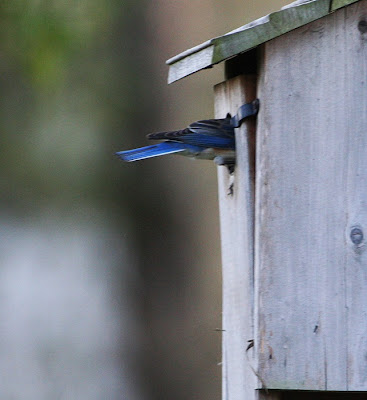Mourning Doves descend on my yard in the late afternoon these days to feed on the ground under the feeders. They are always welcome visitors since they are one of my favorite birds dating all the way back to my childhood on the farm.
*~*~*~*
The decline of the beautiful Monarch butterfly continues. An op-ed in The New York Times this week detailed the full extent of the horror. The butterflies' doom is being written by the conjunction of a variety of lethal factors, including illegal logging in the mountains of Mexico, indiscriminate use of pesticides and herbicides in the factory farms of middle America, and, of course, global warming which is changing the environment faster than the butterflies are able to adapt. Reports this week stated that the winter colonies of the butterflies in Michoacan, Mexico, had receded from 22 acres in 1994 to only 2.9 acres this year.
One of the last, perhaps?
*~*~*~*
From a species that is declining, we go to what is perhaps the most numerous bird in the world - the Red-billed Quelea of Africa. Flocks of hundreds of thousands of the little birds are not uncommon across the skies of the continent.
*~*~*~*
An recent expedition into the mountains of Cambodia to the Virachey National Park discovered 163 species of birds.
*~*~*~*
Over the past three decades, temperatures have risen faster in the Arctic than anywhere else in the world. Consequently, the growing season has gotten longer in the far northern latitudes, bringing major changes to plant communities in tundra and boreal (also known as taiga) ecosystems. The changes are so extensive that they can be seen from space.
*~*~*~*
A study published in Science magazine reconstructs global temperatures further back than ever before -- a full 11,300 years. The reconstruction confirms the "hockey stick," a line graph of global temperature over the last 1,500 years that shows an unmistakable, massive uptick in the twentieth century when humans began to dump large amounts of greenhouse gases into the atmosphere is among the most compelling bits of proof that human beings are behind global warming. As such it has become a favorite target for climate denialists looking to draw a bead on scientists.
*~*~*~*
Canadian researchers have found that louder ambient noise in cities drives some species of birds out because they cannot tolerate it. Thus, the diversity of bird life in cities is reduced.
*~*~*~*
Fossils indicate that birds have evolved from four-winged creatures to the two-winged ones so familiar to us today.
*~*~*~*
Humans love caffeine. Now, we know that bees do, too. Apparently, this may be why the plants developed caffeine in the first place - to attract their pollinators.
*~*~*~*
Some parrots have the ability to barter. Researchers have found that they will trade snacks that are less attractive to them for the snacks which they like better.
*~*~*~*
A red tide off the coast of Florida has already killed dozens of endangered manatees and the phenomenon is continuing, with deadly effect.
*~*~*~*
Scientists who study shorebirds have found that some species reverse the typical role of the sexes. This happens when males outnumber females. In those instances, the males more often will do the incubating and primary care of the young birds.
*~*~*~*
India is experiencing a problem which may be coming to a community near us in the not-too-distant future - namely a lack of clean water for drinking. And again, one of the culprits in reducing available water resources is a changing and warming worldwide climate.
*~*~*~*
Around the backyard:
Mama and Papa Eastern Bluebird are wearing their feathers to a frazzle trying to keep their hungry babies fed this week.
She leans further in to deliver the goods.
And then looks around to make sure everything is okay on the outside.
One last look at her family and...
She's off on another run to the local grocery store!
Relief is in sight for the hard-working birds. Just a few more days and their family will be fledged. Then, perhaps they can take a well-deserved vacation!







It's so depressing to read about the Monarchs. We do what we can for them here in our gardens, providing them with a habitat. But their fate rests somewhere beyond our control.
ReplyDeleteIt is a very distressing story, and, true, we as individuals can only do so much. Still, we must do everything we can.
DeleteIf only our elected "representatives" would do everything THEY can to tackle the problems facing the Monarchs, but they seem too busy kowtowing to Big Oil, Big Pharma, and Big Factory Farms. Nevertheless, we can continue to harass them unmercifully and insist that they take action to address this crisis. Perhaps if enough of us do it, it will have an impact.
We had a pair of E Bluebirds check out our yard boxes a couple of weeks ago but it seems the boxes were not suitable.
ReplyDeleteOn a brighter note, we still have Red-breasted and Brown-headed Nuthatches!
It took a couple of years after we put up our first bluebird box for the birds to accept them, but once they did, they haven't skipped a year, raising at least one and sometimes two broods.
DeleteI'm really surprised that you still have Red-breasted Nuthatches. Mine have (apparently) been gone for weeks - at least I haven't seen them. On the other hand, the wonderful little Brown-headed Nuthatches have been very active in the yard recently. Most gratifying!